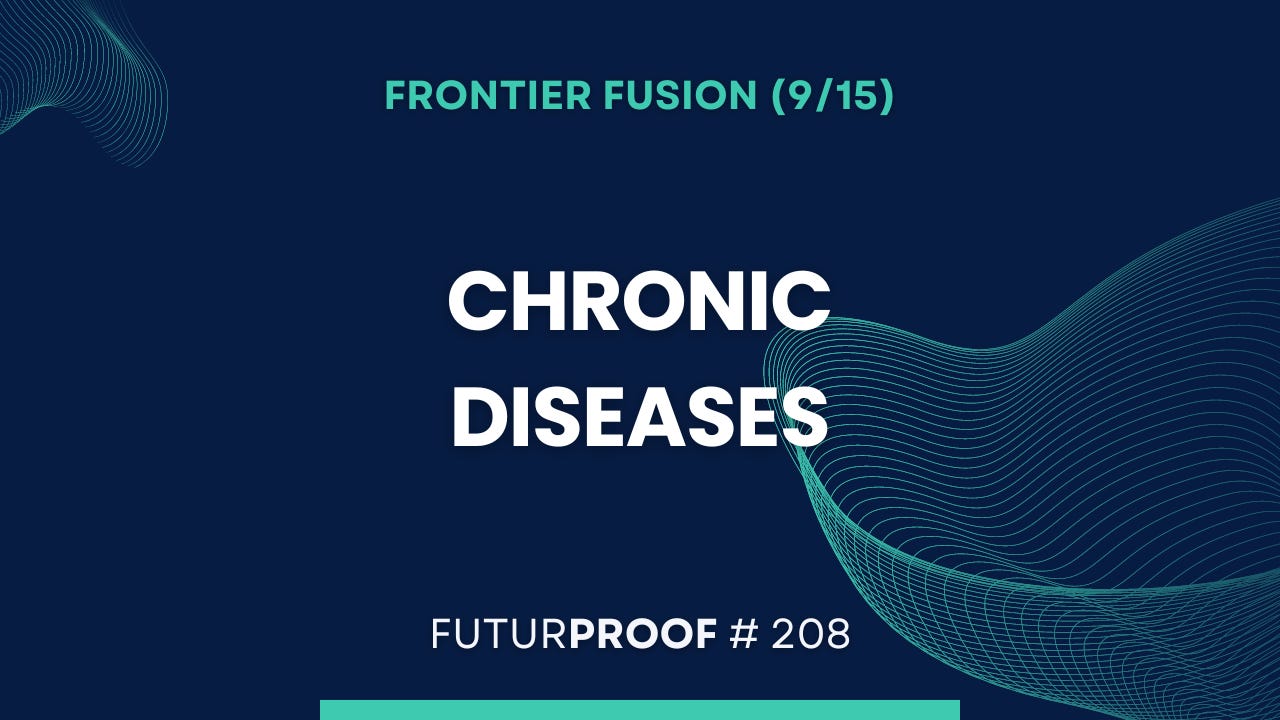FuturProof #208: Frontier Fusion - Chronic Diseases (9/15)
Problem
Chronic diseases, such as cardiovascular ailments, cancers, and diabetes, account for over 71% of all deaths worldwide.
These conditions not only have dire health implications but also lead to increased healthcare costs, reduced labor productivity, and immense strain on global medical infrastructures.
Solution
Blockchain
Data Security & Sharing: Blockchain technology can securely store patient data, ensuring privacy and enabling seamless sharing among authorized medical professionals, enhancing collaborative treatments.
Medication Traceability: Through blockchain, the journey of a drug from manufacturing to patient consumption can be monitored, reducing counterfeits and ensuring medication quality.
Research Collaboration: A blockchain platform can foster collaboration among researchers worldwide by offering a transparent and tamper-proof method of data sharing, leading to faster discoveries and innovations.
Transparent Healthcare Transactions: By recording healthcare transactions on a blockchain, there's clarity in patient treatment histories, insurance claims, and payments, ensuring transparency and reducing fraudulent activities.
Artificial Intelligence
Data Analysis: AI can sift through vast amounts of patient data to detect early signs of chronic diseases, enabling timely interventions and prevention strategies.
Treatment Personalization: Machine learning models can tailor treatment protocols based on individual patient responses, maximizing effectiveness and reducing adverse side effects.
Drug Development: AI can assist in predicting drug interactions and optimize therapeutic compounds, accelerating the development of more potent treatments for chronic diseases.
Predictive Health Insights: AI, by analyzing individual and population health data, can provide insights and forecasts about potential health risks and guide individuals to make proactive health decisions.
IoT Devices
Real-time Health Monitoring: Wearable IoT devices can continuously monitor vital health parameters, allowing for early detection of abnormalities related to chronic diseases.
Patient Adherence: Smart pill bottles and devices can notify patients to take their medications, increasing adherence to treatment regimens.
Environmental Sensing: IoT sensors can monitor and gather data on environmental factors, such as air quality or pollen counts, which can be essential for patients with conditions like asthma or allergies.
Remote Patient Monitoring: Through IoT, healthcare providers can monitor patients in real-time, reducing hospital readmissions and enabling timely interventions.
Superconductors
Enhanced Medical Equipment: Superconducting technologies can revolutionize medical imaging tools, like MRI, providing more accurate diagnostics crucial for detecting and managing chronic diseases.
Advanced Research Capabilities: Superconductors can provide tools for breakthrough research at the cellular or molecular level, potentially uncovering new therapeutic strategies or insights into disease mechanisms.
Conclusion
The increasing prevalence of chronic diseases calls for integrated and advanced solutions. By uniting the capabilities of AI, IoT devices, blockchain, and superconductors, a comprehensive and transformative approach can be put together.
These technologies, collectively, have the potential to redefine healthcare, making it more proactive, efficient, and patient-centric in the battle against the chronic disease epidemic.
Disclaimers: http://bit.ly/p21disclaimers
Not any type of advice. Conflicts of interest may exist. For informational purposes only. Not an offering or solicitation. Always perform independent research and due diligence.




